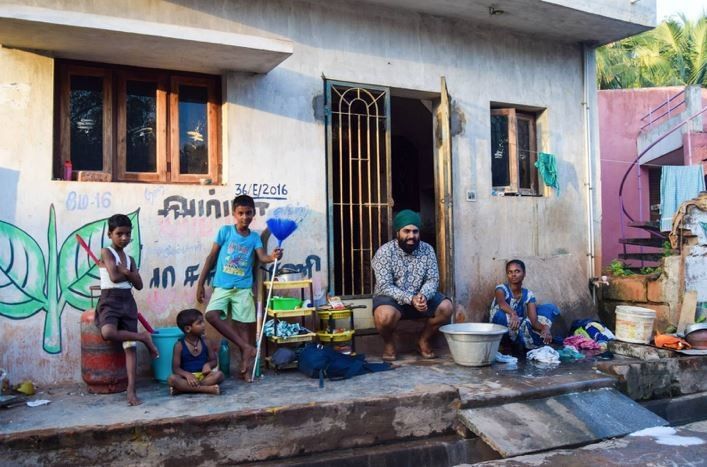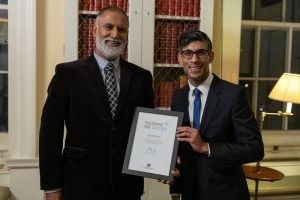Sikh engineer Navjot Sawhney, who created hand-cranked washing machine to support families worldwide and Glasgow charity founder Khalid Raza, who recycles wheelchairs for the disabled, have won the UK prime minister Rishi Sunak’s Points of Light Award.
Sawhney set up the Washing Machine Project four years ago which can be operated in regions without electricity.
The energy-efficient manual washing machine for low-income groups around the world, was inspired by Sawhney’s volunteering work in India.
The London engineer’s hand-cranked washing machine is benefitting over 1,000 families without access to an electric machine in underdeveloped countries or refugee camps, including humanitarian aid centres in Poland for Ukrainian refugees.

“Your innovative, hand-cranked washing machines are giving families the dignity of clean clothes and the time you are saving them is empowering many women who have been held back from education and employment,” said Sunak in a personal letter to Sawhney.
“Your ingenuity, compassion and dedication to improving the lives of others is an inspiration to us all.”
Previously employed by Dyson, a technology firm well known for vacuum cleaners, Sawhney wanted to use his skills to improve the quality of life for disadvantaged communities.
He named his first machines after his neighbour Divya and the Washing Machine Project was created to manufacture the “Divya” devices on a wider scale, with over 300 machines so far distributed worldwide to places including refugee camps, schools and orphanages.
“Winning the Points of Light award and getting recognised by the Prime Minister is a phenomenal privilege. ‘The Washing Machine Project’s mission is to alleviate the burden of unpaid labour, mainly on women and children. I’m so proud that giving back the dignity of clean clothes to those who hand wash them is getting the recognition it deserves. Thank you to our team, volunteers, partners and beneficiaries who work tirelessly daily to make our mission a success,” said Sawhney.
Raza created the charity, ‘Wheels to Heal’, a collaborative of volunteers that has rescued over 24,000 wheelchairs and disability aids destined for landfill in Scotland and across the UK, and upcycled these for disabled people overseas who face barriers to mobility.
The concept of the charity was formed after the chance discovery of 150 wheelchairs destined for scrap in Glasgow and realising that these could easily be recycled and prove transformative for disabled people without access to mobility equipment.

Raza’s charity has sent items to countries including Afghanistan, Bangladesh, Gambia, Ghana, Iraq, Lebanon, Pakistan, Palestine, Malawi, Somalia, Sri Lanka, Syria, Uganda, and Yemen.
It offers a collection service covering all of mainland Scotland and the UK as well as drop off points in key hubs. It also runs an uplift service allowing over 500 care homes across the UK to donate unused but good-quality mobility aids.
“As a charity operating on a shoestring budget, none of this would have been possible without the support of my parents and children, extended family, and friends, the goodwill given by UK businesses and community representatives, the donations received from people from all communities and walks of life, and our in-country charity partners,” Raza said after receiving the award.
“The concept of ‘Wheels to Heal’ was formed unintentionally after the chance discovery of 150 wheelchairs destined for scrap in Glasgow, Scotland. The inability and decision to not look away had a ripple effect and eventually we had the vision to expand the service of up-cycling aids throughout the United Kingdom. We hope this recognition of the environmental and humanitarian benefits of ‘Wheels to Heal’ will inspire more people to do the right thing when faced with similar choices.”
